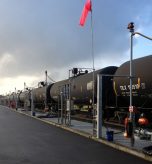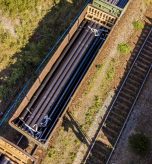Introduction
Let me be frank with you all — our industry stands at a critical crossroads. After twenty years in oil and gas supply chain management, I’ve never seen this level of disruption. Industry 4.0 isn’t just another buzzword; it’s our path forward. The potential value is staggering — industry reports project we could unlock between $1.6-2.6 trillion by 2025.
Despite all the conference presentations, McKinsey finds 70% of digital initiatives fail to move beyond the pilot stage. I’ve witnessed firsthand what works and what doesn’t, and I want to share what I’ve learned about navigating this journey successfully as both a practitioner and through our oil and gas consulting services.
Understanding Industry 4.0 in Our Context
Digital transformation is essential for oil and gas supply chain management because:
- Operational efficiency — In an era of razor-thin margins, supply chain optimization services are not optional but essential for survival
- Enhanced safety — Real-time monitoring systems prevent serious incidents
- Cost reduction — PwC suggests we could cut production costs by up to 20%
- Competitive edge — Those who resist won’t be around in ten years
Key Technologies Reshaping Our Industry
AI and Machine Learning
When we first implemented AI for inventory optimization, I was skeptical. Three months later, we’d reduced inventory carrying costs by 23%. Our predictive maintenance algorithms have prevented equipment failures that would have cost millions. This exemplifies why supply chain technology companies are now essential partners in our industry’s evolution.
IoT and Sensors
IoT has revolutionized our asset tracking within oil and gas logistics. We used to lose millions annually to misplaced equipment. Now we know exactly where everything is, how it’s being used, and can detect potential risks before they become dangerous.
Digital Twins
My team recently used our compressor station digital twin to test three different maintenance strategies, identifying one that extended equipment life by 40% while reducing downtime. That would have taken years of costly real-world experimentation. This is precisely why energy management consultants are increasingly focused on digital replication technologies.
Automation and Robotics
One of our refineries deployed automated production systems that increased throughput by 7% while reducing safety incidents by 23%. The ROI was clear within the first year. Drone surveys now complete in hours what used to take teams of people days.
How to Implement Industry 4.0 Successfully
Start with Assessment and Strategy
Start by honestly evaluating your current technologies, processes, and skills. Ensure all digital initiatives align with business goals. I’ve seen technically impressive projects fail because they didn’t address actual business needs. This is where industrial consulting services provide tremendous value.
ROI modeling has been invaluable for securing investment. Detailed projections make budget discussions with finance much more productive. The best supply chain design consultants excel at creating these models.
Build Your Digital Infrastructure Thoughtfully
A robust digital infrastructure forms the foundation of success. Don’t underestimate cybersecurity — as systems become more connected, they also become more vulnerable. This isn’t just about preventing data theft — it’s about ensuring operational continuity and safety in your oil and gas supply chain.
Transform Your Workforce Thoughtfully
Digital transformation is about technology, but it’s even more about people. Change management is absolutely crucial. One practice that’s worked well is appointing digital ambassadors throughout the organization to champion our digital culture.
Implement in Phases
A phased implementation approach consistently gives the best results:
- Start with pilot projects in controlled environments
- Design solutions with enterprise-wide scalability in mind
- Track value continuously against expected outcomes
- Refine solutions based on performance data
How Industry 4.0 Transforms Our Value Chain
Digital technologies have revolutionized how we discover and analyze resources. Advanced seismic imaging has dramatically improved exploration success rates. Automated drilling systems maintain optimal parameters in real-time.
In production, AI-driven optimization continuously adjusts parameters for maximum output with minimum resource consumption. Predictive maintenance has virtually eliminated unplanned downtime in some fields.
Our pipeline networks are now smarter with digital solutions that detect potential issues before failures. Refinery optimization continuously adjusts processes for maximum efficiency, while predictive maintenance reduces downtime. Logistics optimization has become a cornerstone of modern oil and gas supply chain management.
Overcoming Common Challenges
Legacy Systems Integration
Develop APIs between systems, use middleware solutions as translation layers, and adopt phased migration approaches. Maintain critical legacy functions while adding digital capabilities. This is where oil and gas consulting firms offer critical expertise.
Cost and ROI Justification
Develop detailed business cases that connect initiatives directly to business outcomes. Phased investment spreads costs while delivering incremental benefits. Due diligence consultants can help validate these investment plans.
Organizational Resistance
Change management has been crucial for overcoming resistance:
- Involve key personnel from the beginning to build ownership
- Communicate clearly about the purpose and benefits
- Demonstrate early successes to build confidence
- Ensure visible executive commitment
Success Stories We Can Learn From
BP has leveraged advanced analytics to transform operations, substantially reducing unplanned downtime. Their approach to scaling solutions — pilot carefully, validate rigorously, then deploy rapidly — is worth emulating for those in oil and gas supply chain companies.
Shell has taken a comprehensive approach to IoT and AI integration, demonstrating the value of addressing technology, processes, and people simultaneously. This aligns with best practices from market analysis consultants.
ExxonMobil has used remote monitoring to centralize expertise, allowing specialists to support multiple facilities from central locations. This reflects modern approaches to logistics procurement and distributed expertise.
Chevron’s digital twin technology has transformed how they approach maintenance and operations, testing changes virtually before implementation. Their work showcases the future of sustainable supply chain companies in our sector.
Measuring Success and Future Trends
Select metrics that tie directly to business value:
- Operational efficiency improvements
- Cost reductions
- Safety incident prevention
- Production increases
The future holds exciting developments in autonomous operations, blockchain applications for supply chain transparency, and extended reality for training and remote assistance. Energy procurement consulting will increasingly focus on these technologies.
Final Thoughts: Your Roadmap to Success
Digital transformation isn’t just about implementing technologies—it’s about reimagining how we operate. Success requires addressing technology, people, processes, and strategy in a coordinated way.
Develop a clear roadmap aligned with business objectives. Invest in the right capabilities, both technological and human. Maintain an unwavering focus on business outcomes. This is the core of what the best oil and gas supply chain and procurement specialists offer.
The journey is challenging, but the rewards—increased efficiency, enhanced safety, reduced environmental impact, and improved competitiveness—make it essential for any oil and gas company looking to thrive in our changing energy landscape.
Those who embrace this change thoughtfully will lead our industry into the future. The choice is clear. The time is now.
References
- Digital transformation and trends for tapping connectivity in the oil and gas sector – ScienceDirect
- Digital Transformation of the Oil & Gas Industry (2025) – Whatfix
- Digital Transformation in Oil and Gas Industry in 2025 – FlowForma
- Digital Transformation Trends in the Oil and Gas Industry – Revolution Data Systems
- The Implementation of Industry 4.0 in Oil and Gas – GEP















